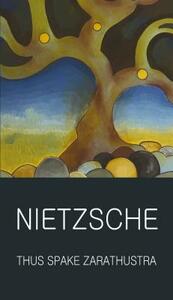Take a photo of a barcode or cover
emotional
hopeful
informative
inspiring
reflective
relaxing
medium-paced
De mis favoritos. God bless
Thus Spoke Zarathustra
A book for none and all written by the German philosopher Fredric Nietzsche in 1883 and 1891. Divided into four parts, It is a philosophical comedy book that tells the story of Zarathustra, an ancient Persian prophet, yet in a different setting. It discusses three main themes; The Super man , Eternal recurrence, and Will to Power. The ideas explored were truly intriguing, but there is some superficiality in them and I found the style of Nietzsche ambiguous and extravagant.
In part I, Zarathustra descends from a solitary period of 10 years he spent in the mountain contemplating on life and building his philosophy. He wants to “go down” as he is “bee that has gathered too much honey” and now he wants to teach people about the “Superman.” The Superman is the idea that human beings are not the last outcome of human evolution. They are an evolved version of animals. They are only a bridge to a high creature called “The Higher Man”; an ideal human being with unique features that he makes by himself. This is reinforced by the idea that “God is dead.” This latter means that God is an obsolete entity that can no longer help us to make sense of our complex life. Zarathustra starts preaching this idea to common people, yet everyone starts mocking at him and deprecating his idea, thus, he concludes that “he is not the mouth for these ears”.
Here Zarathustra thinks that he should have disciples who believes in him and understands his values because not everyone can grasp what he teaches. He starts teaching them about the ideas of eternal recurrence and the will to power.
In part II, Zarathustra spends time his disciples teaching them about the “Eternal recurrence and the Will to Power, as well as reinforcing the idea of the Superman”. Eternal recurrence is a hypothetical idea presented by Nietzsche. Is states that we are living within an eternal circle that keeps recurring forever, i.e., all the actions human beings do now will happen again in the future and forever. This encourages human beings to exploit their lives and focus on the material existing life that they have so they can feel content about them, recurring forever. He teaches them too about the Will of Power; that the main drive of human beings and the whole universe is to live, change, and stay in existence (achievement, ambition, and the striving to reach the highest possible position in life) However, Zarathustra feels anxious and disturbed when his disciples sometimes ignore his teachings and follow stories they heard before, or when they follow and imitate Zarathustra blindly.
In part III, Zarathustra goes back to his solitude in a cave in a high mountain. He starts having monologues after he left his disciples. He tackles in depth the ideas he advocated for previously . In part V, Zarathustra grows old and while he is contemplating on the stone, he hears sounds and cries of “distress”. These cries are from individuals from different backgrounds who became Higher Men. They possess the features of the Higher Man. He invites all of them to his cave and discuss with them . Still, he feels they have not ascended to the state of The Higher Man, but they are merely bridges.
Concerning the style, I enjoyed it in the beginning but that enjoyment started to decrease while I was going through it. Maybe the version I read “Penguin Classics” makes it complicated in terms of diction, but the semantic of the ideas is superficial and in many instances I felt bored and disinterested particularly in the middle of the book.
Overall, I enjoyed reading it and I liked the ideas even if they were hypothetical and superficially tackled, their ethical implication helps one to be more thoughtful in life.
Here is a passage that I liked:
“This, however, is my teaching: He who wants to learn to fly one day must first learn to stand and to walk and to run and to climb and to dance - you cannot learn to fly by flying! With rope-ladders I learned to climb to many a window, with agile legs I climbed up high masts: to sit upon high masts of knowledge seemed to me no small happiness - to flicker like little flames upon high masts: a little light, to be sure, but yet a great comfort to castaway sailors and the shipwrecked!
I came to my truth by diverse paths and in diverse ways: it was not upon a single ladder that I climbed to the height where my eyes survey my distances.
And I have asked the way only unwillingly - that has always offended my taste! I have rather questioned and attempted the ways themselves.
All my progress has been an attempting and a questioning - and truly, one has to learn how to answer such questioning!
That however - is to my taste: not good taste, not bad taste, but my taste, which I no longer conceal and of which I am no longer ashamed. "This - is now my way: where is yours?"
Thus I answered those who asked me 'the way'. For the way - does not exist!
Thus spoke Zarathustra.
A book for none and all written by the German philosopher Fredric Nietzsche in 1883 and 1891. Divided into four parts, It is a philosophical comedy book that tells the story of Zarathustra, an ancient Persian prophet, yet in a different setting. It discusses three main themes; The Super man , Eternal recurrence, and Will to Power. The ideas explored were truly intriguing, but there is some superficiality in them and I found the style of Nietzsche ambiguous and extravagant.
In part I, Zarathustra descends from a solitary period of 10 years he spent in the mountain contemplating on life and building his philosophy. He wants to “go down” as he is “bee that has gathered too much honey” and now he wants to teach people about the “Superman.” The Superman is the idea that human beings are not the last outcome of human evolution. They are an evolved version of animals. They are only a bridge to a high creature called “The Higher Man”; an ideal human being with unique features that he makes by himself. This is reinforced by the idea that “God is dead.” This latter means that God is an obsolete entity that can no longer help us to make sense of our complex life. Zarathustra starts preaching this idea to common people, yet everyone starts mocking at him and deprecating his idea, thus, he concludes that “he is not the mouth for these ears”.
Here Zarathustra thinks that he should have disciples who believes in him and understands his values because not everyone can grasp what he teaches. He starts teaching them about the ideas of eternal recurrence and the will to power.
In part II, Zarathustra spends time his disciples teaching them about the “Eternal recurrence and the Will to Power, as well as reinforcing the idea of the Superman”. Eternal recurrence is a hypothetical idea presented by Nietzsche. Is states that we are living within an eternal circle that keeps recurring forever, i.e., all the actions human beings do now will happen again in the future and forever. This encourages human beings to exploit their lives and focus on the material existing life that they have so they can feel content about them, recurring forever. He teaches them too about the Will of Power; that the main drive of human beings and the whole universe is to live, change, and stay in existence (achievement, ambition, and the striving to reach the highest possible position in life) However, Zarathustra feels anxious and disturbed when his disciples sometimes ignore his teachings and follow stories they heard before, or when they follow and imitate Zarathustra blindly.
In part III, Zarathustra goes back to his solitude in a cave in a high mountain. He starts having monologues after he left his disciples. He tackles in depth the ideas he advocated for previously . In part V, Zarathustra grows old and while he is contemplating on the stone, he hears sounds and cries of “distress”. These cries are from individuals from different backgrounds who became Higher Men. They possess the features of the Higher Man. He invites all of them to his cave and discuss with them . Still, he feels they have not ascended to the state of The Higher Man, but they are merely bridges.
Concerning the style, I enjoyed it in the beginning but that enjoyment started to decrease while I was going through it. Maybe the version I read “Penguin Classics” makes it complicated in terms of diction, but the semantic of the ideas is superficial and in many instances I felt bored and disinterested particularly in the middle of the book.
Overall, I enjoyed reading it and I liked the ideas even if they were hypothetical and superficially tackled, their ethical implication helps one to be more thoughtful in life.
Here is a passage that I liked:
“This, however, is my teaching: He who wants to learn to fly one day must first learn to stand and to walk and to run and to climb and to dance - you cannot learn to fly by flying! With rope-ladders I learned to climb to many a window, with agile legs I climbed up high masts: to sit upon high masts of knowledge seemed to me no small happiness - to flicker like little flames upon high masts: a little light, to be sure, but yet a great comfort to castaway sailors and the shipwrecked!
I came to my truth by diverse paths and in diverse ways: it was not upon a single ladder that I climbed to the height where my eyes survey my distances.
And I have asked the way only unwillingly - that has always offended my taste! I have rather questioned and attempted the ways themselves.
All my progress has been an attempting and a questioning - and truly, one has to learn how to answer such questioning!
That however - is to my taste: not good taste, not bad taste, but my taste, which I no longer conceal and of which I am no longer ashamed. "This - is now my way: where is yours?"
Thus I answered those who asked me 'the way'. For the way - does not exist!
Thus spoke Zarathustra.
challenging
dark
informative
reflective
slow-paced
So he did make some salient points but my guy has a fantastically optimistic opinion of humanity if he thinks that this individualistic, 'will to power', every man for himself concept would cause anything but the downfall of society and the purge.
Like... "because I can" and "inequality is Correct" have inspired all of the most horrific atrocities in human history!
Also my boy either does not understand or does not care about systemic oppression. Like "just get over it" is fantastically unhelpful in a framework designed to eradicate you from conception.
Also I hate it when brilliant philosophers are making good points and then in the next sentence go "oh yeah also i don't think women are people haha <3" like okay cool thanks so much, go jump in a lake!
In conclusion, if nietszche were alive today I would lock him in a really small box and then poke him with sticks and tell him if he were a real superman he'd be able to overcome this trial and consider me a friend for challenging him :)
Like... "because I can" and "inequality is Correct" have inspired all of the most horrific atrocities in human history!
Also my boy either does not understand or does not care about systemic oppression. Like "just get over it" is fantastically unhelpful in a framework designed to eradicate you from conception.
Also I hate it when brilliant philosophers are making good points and then in the next sentence go "oh yeah also i don't think women are people haha <3" like okay cool thanks so much, go jump in a lake!
In conclusion, if nietszche were alive today I would lock him in a really small box and then poke him with sticks and tell him if he were a real superman he'd be able to overcome this trial and consider me a friend for challenging him :)
challenging
slow-paced
hopeful
inspiring
reflective
slow-paced
challenging
reflective
slow-paced
challenging
hopeful
informative
inspiring
reflective
slow-paced






